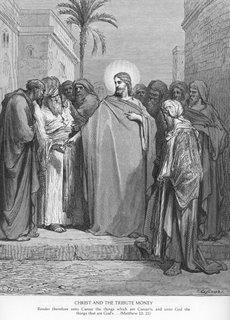In the Introit of the Mass, the justice and mercy of God are praised. "Thou art just, O Lord, and Thy judgment is right. Deal with Thy servant according to Thy mercy. Blessed are the undefiled in the way, who walk in the law of the Lord."(Ps. 118). Glory be to the Father, etc.
Prayer
Grant to Thy people, we beseech Thee, O Lord, to avoid the contagion of the devil, and with a pure mind to seek Thee, the only God. Through Our Lord Jesus Christ, etc.
EPISTLE Eph. 4:1-6
I therefore, a prisoner in the Lord, beseech you that you walk worthy of the vocation in which you are called, With all humility and mildness, with patience, supporting one another in charity. Careful to keep the unity of the Spirit in the bond of peace. One body and one Spirit; as you are called in one hope of your calling. One Lord, one faith, one baptism. One God and Father of all, who is above all, and through all, and in us all.
Practice
The words, "one Lord, one faith, one baptism, one God and Father of all," confound those who assert that a man may be saved in any belief. There can be but one true religion; they who profess it should be united by the bond of true charity, and their lives be worthy of their vocation to the true faith.
GOSPEL Matt. 22:35-46
And one of them, a doctor of the law, asking him, tempting him: Master, which is the greatest commandment in the law? Jesus said to him: Thou shalt love the Lord thy God with thy whole heart, and with thy whole soul, and with thy whole mind.
This is the greatest and the first commandment. And the second is like to this: Thou shalt love thy neighbor as thyself. 40 On these two commandments dependeth the whole law and the prophets. And the Pharisees being gathered together, Jesus asked them, saying: What think you of Christ? Whose son is he? They say to him: David's. He saith to them: How then doth David in spirit call him Lord, saying: The Lord said to my Lord, Sit on my right hand, until I make thy enemies thy footstool? If David then call him Lord, how is he his son? And no man was able to answer him a word; neither durst any man from that day forth ask him any more questions.
Why is this commandment to love God and our neighbour called the great commandment?
Because in these two are contained all the others, so that he who fulfils these fulfis the whole law. For whoever loves God with his whole heart does not murmur against God; does not dishonour His name by cursing and swearing; does not desecrate the Sabbath-day, because he knows that all this is offensive to God. On the contrary, he hopes in God; gives thanks and praise to God; sanctifies the Sundays and holy-days, because he knows this to be pleasing to God; observes the precepts of the Church, because he knows it to be the will of God that he should hear the Church; honours his parents; does no injury to his neighbour; does not commit adultery; does not steal; slanders no one; bears no false witness; pronounces no unjust judgment; it is not envious, malicious, unmerciful, but rather practices towards every one the corporal and spiritual works of mercy; and all this because, out of love of God, he loves his neighbour as himself. Thus love fulfils all the commandments.
What is the meaning of the question, "What think you of Christ?"
Christ put this question to the Pharisees in order that, by their own answer, He might convince them that He was not merely a lineal son of David, but that he was the Son of God, begotten from eternity, on which account He called Himself David's Lord. That Christ is the Son of God, our Lord, our Teacher, our Lawgiver, our Redeemer and Saviour, we Christians know well, for we daily profess it; but how many of us, in deeds, deny it, since we do not follow His teaching nor observe His commandments! What, then, will Christ one day be to such? What but a judge to condemn, and a God to punish?
Why must we love our neighbour?
Because we are all, not merely by descent from Adam, but much more through the grace of Jesus, children of God and members of one family. As children of God, we bear in us the likeness of God. But God loved and still loves all men; for the salvation of all He gives up His only Son, that all may be saved; shall we then love and hate another, and yet think to be like God? Through the grace of Jesus we are all redeemed, made members of His body, yes, partakers of His body and blood. Therefore St. Paul admonishes us: "You are all one in Christ"(Gal 3:28), "be therefore careful to keep the unity of the spirit in the bond of peace"(Ephesians 4:3). How natural is it for the members of one body not to wound each other! Jesus, our Redeemer, gave His life for us when we were His enemies (Romans 5:10), and even on the cross prayed for His murderers. We are His disciples. But can we be allowed to call ourselves so without possessing this mark of His discipleship? (John 18:15). Thus everything incites us to love: the law of nature and of revelation, the example of Christ, all the promises and hopes that we have. In truth, how, without love, could we hope to enter the kingdom of love? There can be no answer to this reasoning: "Would you be a disciple of Jesus, an heir of His Kingdom?" then love like Him; and He has shed His blood for His mortal enemies.






























